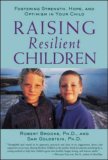Summary | Excerpt | Reviews | Readalikes | Genres & Themes | Author Bio
Fostering Strength, Hope, and Optimism in Your Child

Critics' Opinion:
Readers' Opinion:
First Published:
Apr 2001, 320 pages
Paperback:
Oct 2002, 336 pages
While many parents believe that they are empathic, experience shows that it is easier to be empathic when our children do what we ask them to do, are successful in their activities, and are warm and responsive. It is much more difficult to be empathic when we are upset, angry, annoyed, or disappointed with our children. When we feel this way, even well-meaning parents say or do things that actually work against a child in developing resilience.
The following two examples capture the extent to which frustration can compromise a parent's capacity to be empathic.
John's parents, Mr. and Mrs. Kahn, couldn't understand why their seemingly intelligent seventh-grade son experienced so much difficulty completing his homework. John was athletically gifted but had a long history of problems learning to read. His parents, observing John's lack of interest in school activities, believed he could do the work if he "put his mind to it" and frequently exhorted him to "try harder." They chided him as to how awful he would feel as a senior in high school when he was not accepted into the college of his choice.
In an effort to motivate John, his parents told him that he would not be allowed to participate in any after-school sports, an area in which he excelled, if he obtained a grade lower than a B. In telling John to "try harder," while perhaps well intentioned, they failed to consider how these words were experienced by John. Many youngsters who are repeatedly told to "try harder" hear these not as helpful words but rather as judgmental or accusatory, increasing their existing frustration with school rather than their motivation to succeed. Thus, the words the Kahns used worked against their goal to motivate John.
Sally, a shy eight-year-old, was often prompted by her parents, Mr. and Mrs. Carter, to say hello when encountering family friends. Yet, from a young age, Sally seemed anxious, fearful, and easily overwhelmed in new situations. She would hide behind her mother in public places or when strangers came to the house. The Carters couldn't comprehend why Sally appeared so nervous around others, especially since they saw themselves as loving parents. They told Sally that if she didn't learn to say hello, other people would not want to be with her. At best, Sally was able to glance down and whisper, "Hi."
Sally's parents, wanting their daughter to be more outgoing, failed to appreciate that Sally's shyness was an inborn temperamental trait and could not be overcome simply by telling her to "say hello" to others. Frequently reminding shy children to say hello can heighten their anxiety and increase their tendency to withdraw as a means of escaping an uncomfortable situation.
Parents who are empathic think about how they would feet if someone said or did the same things to them that they said or did to their children. If we are trying our best, yet struggling with an activity, would we find it helpful to have someone exhort, "Try harder!"? How many shy adults would welcome the advice to "go out and make friends"? If a child is shy, an empathic statement together with words of encouragement is more likely to lead to success, self-worth, and resilience.
For example, one father told his shy daughter that many kids find it difficult to say hello and that he would be of whatever help he could so that it might become easier for her to greet people in the future. Such a statement validates what the child is experiencing in a nonjudgmental way and offers hope for change. It creates a climate in which resilience is able to thrive.
We are often asked if people can increase their ability to be empathic. We believe they can. Parents can be guided by certain questions that help foster empathy, such as: "How would I hope my child describes me?"; "How would my child actually describe me, and how close is that to how I hope my child would describe me?"; "When I talk to or do things with my children, am I behaving in a way that will make them most responsive to listening to me?"; and "Would I want anyone to speak to me the way I am speaking to my child?" Parents who are able to go beyond their frustration or annoyance and ask these kinds of questions of themselves are practicing empathy, a key component of an effective parenting mindset.
Copyright © 2001 Robert Brooks and Sam Goldstein





The Funeral Cryer by Wenyan Lu
Debut novelist Wenyan Lu brings us this witty yet profound story about one woman's midlife reawakening in contemporary rural China.
Your guide toexceptional books
BookBrowse seeks out and recommends the best in contemporary fiction and nonfiction—books that not only engage and entertain but also deepen our understanding of ourselves and the world around us.